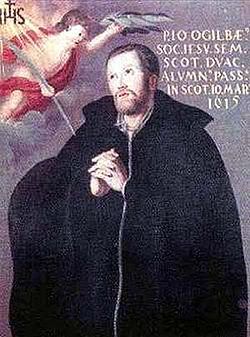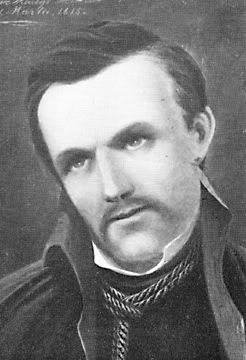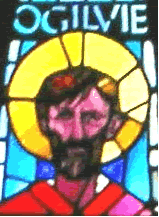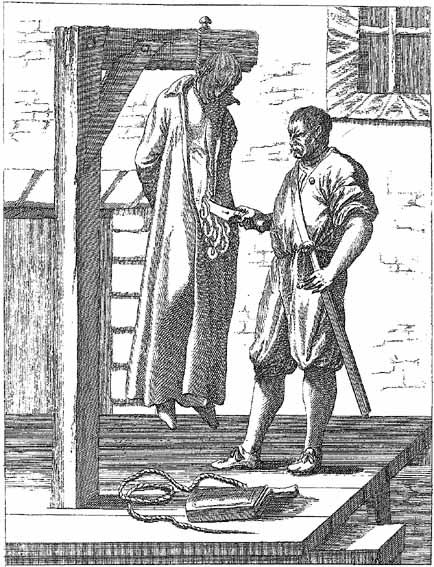Born the son of a wealthy land owner and Scottish noble, John was raised in a Calvinist family near Keith in Banffshire, during the great time of trial in the Catholic Church of Scotland (after 1560, it had been made illegal, under penalty of treason, to preach the Catholic faith in Scotland). John was sent by his father to be educated in mainland Europe, with him studying under the Benedictines in Germany and the Jesuits the Czech Republic. During this time, John was frequently troubled by the scholars of the Catholic Church, whose faith and Scriptural acumen was difficult to argue. Following reflection on the Scriptures, especially the passages “God wills all men to be saved and come to the knowledge of the truth” (1 Timothy 2:4) and “Come to me all you who are weary and find life burdensome, and I will refresh you” (Matthew 11:28), he converted to Catholicism at age 17.
Upon ordination, John requested assignment in Scotland, after hearing of the active persecution of Catholics at home from returning Jesuit missionaries. Wholesale massacres of Catholics were taking place in Scotland at that time, but these persecutions were concentrated on priests who openly attended and celebrated Mass. The Jesuits were determined to minister to the oppressed Catholic congregation, but at great peril to themselves. If captured, they were likely to be tortured for information, then hanged, drawn, and quartered. "Send only those," wrote a Scottish Catholic sympathizer and noble to the Jesuit General, "who wish for this mission and are strong enough to bear the heat of the day, for they will be in exceeding danger."
John’s request was granted after numerous requests, but his ministry would last only 11 months. Returning to Scotland disguised as a horse trader, John ministered to the faithful, celebrating private Masses in the homes of Catholics in hiding. Eventually, he was betrayed, and put on trial. The trial, biased by all accounts, lasted for 9 days, during which he was prevented from sleeping, fed less than once a day, poked with sharp sticks, and had his hair pulled out in torture. Yet he would not reveal the names of any other believers. He said to his persecutors, "Your threats cheer me; I mind them no more than the cackling of geese." And when they mocked him, asking him if he were afraid to die, he responded, "No more than you do to dine."
John refused to renounce his Lord, and repeatedly stated the spiritual authority of the pope, rather than the king. In his own words, during trial, John stated, “In all that concerns the king, I will be slavishly obedient; if any attack his temporal power, I will shed my last drop of blood for him. But in the things of spiritual jurisdiction which a king unjustly seizes I cannot and must not obey." He was sentenced to death for high treason against the king, and at age 36, was publicly hanged and disemboweled. His last words were recorded by the crowd: "If there be here any hidden Roman Catholics, let them pray for me but the prayers of heretics I will not have.” At the moment of his death, it is said that he threw his Holy Rosary beads into the crowd, with one of his persecutors catching them. Pious legend tells us that the recipient of those beads converted and remained a devout Catholic the remainder of his life.
Saint John Ogilvie’s body was buried in the cemetery at Glasgow Cathedral. He was canonized in 1976, the first Scottish saint to be canonized in nearly 700 years, and the only post-Reformation Scottish saint. His courage and zeal for preaching the word of God, even at great physical peril to himself, continues to inspire us today. Fearing a righteous death for the Lord no more than his enemies feared their tasks of daily living, John resolutely defended the Church at a time when it was suffering great persecution. The parallels between Saint John Ogilvie’s persecution and the persecution of the Church today are clear… but are we clear defenders of the faith and the Church?
Day 69 of 365
Prayer Intentions: Courage and zeal to defend our Church and faith.
Requested Intentions: The blessing of children (S); Safety of travelers (J); Improved family relationship with the Lord, using gifts for His glory (L); For the orphans of Saint Francis Xavier in India (Fr. B); For the health of a family member with Rett’s Disorder (C); For the restoration of hearing (L); For a restorative, faith-deepening Lent for all those who are struggling (L).
Special Intentions (Day 28 of 45-day Novena to Our Blessed Lady of Lourdes): The intentions of all those who read this blog, whether submitted or retained in the quiet of their hearts; Penance, Penance, Penance for sinners; For all those who are suffering.












0 comments:
Post a Comment
Thanks for leaving a comment. If you wish to submit a prayer request, however, please do so above, using the "Contact" tab.